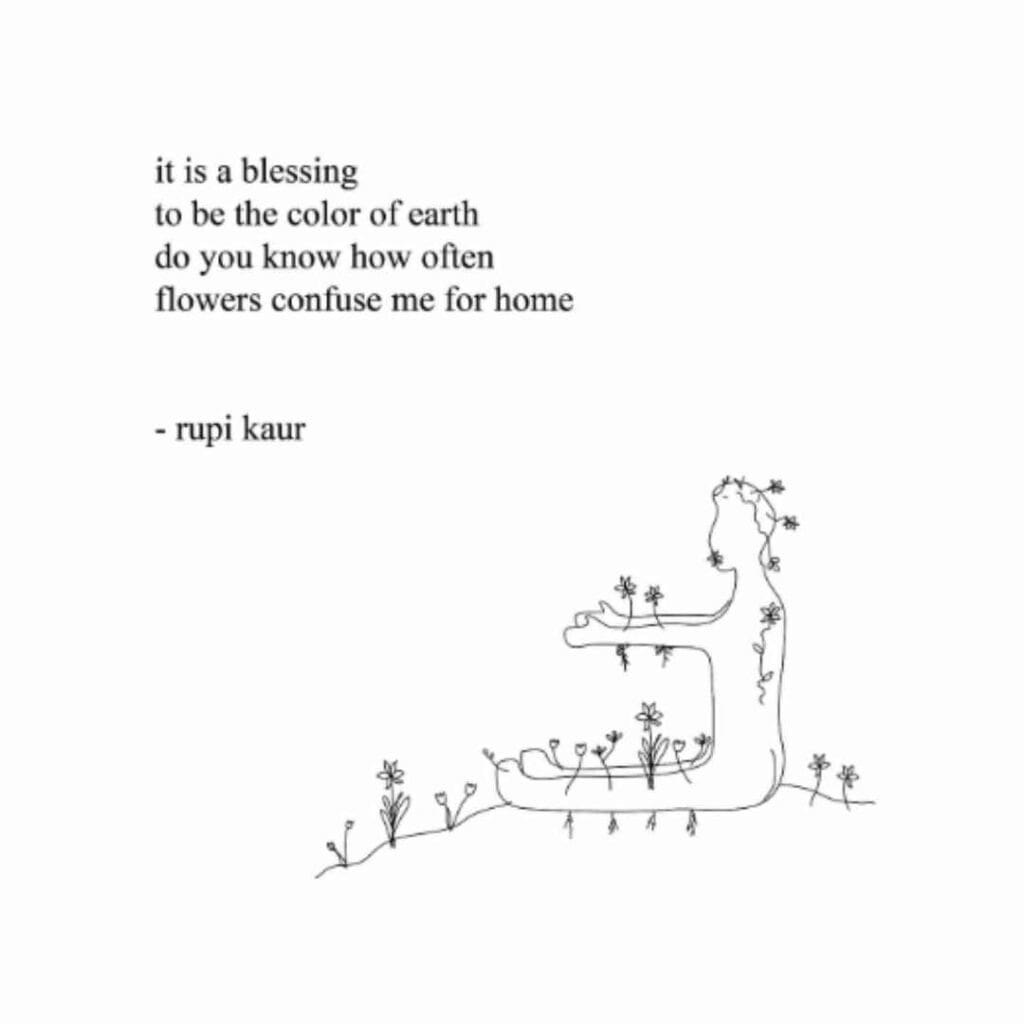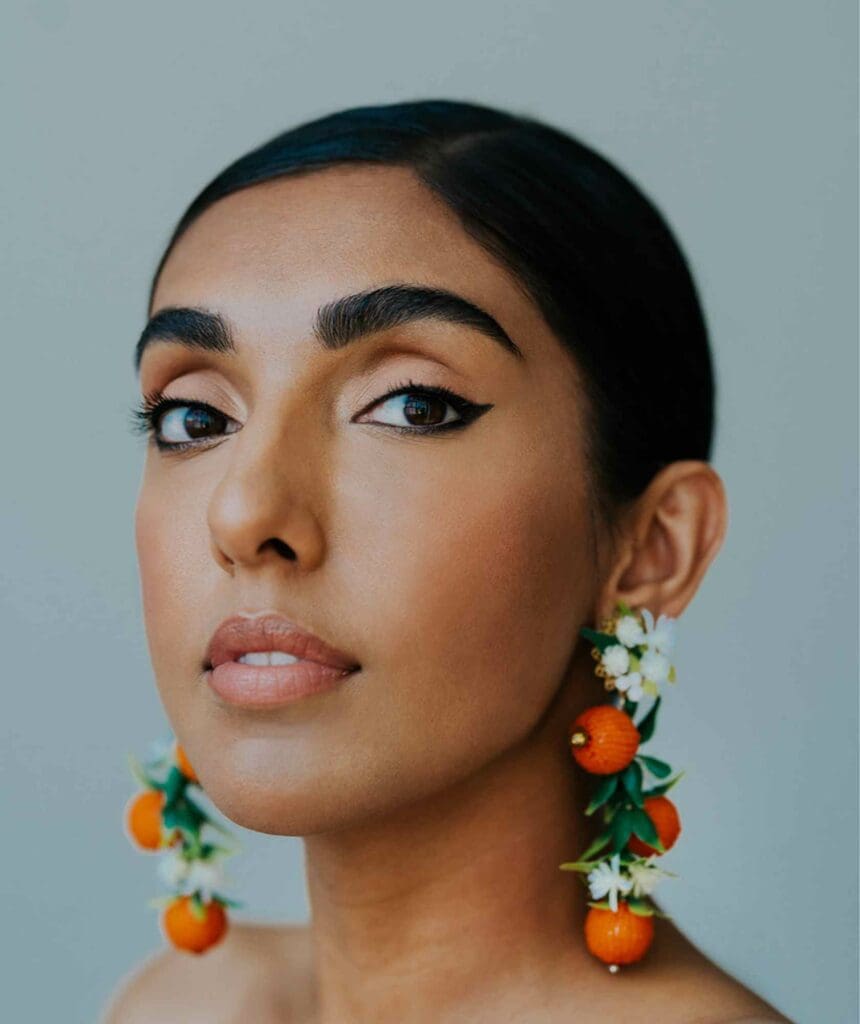Her poems made her a global sensation but her vulnerability has also made her a beloved public figure. On the eve of her world tour arriving in Aotearoa next month, poet Rupi Kaur talks to Capsule about how touring brings out her insecure teenage self, bringing poetry to a new generation and why the pandemic years led to a crisis of confidence.
If you found yourself suffering from a crisis of confidence during the past Covid years, just know that internationally renowned poet Rupi Kaur was right there alongside you. The Punjab-born poet, who grew up in Canada, moved back home with her parents for part of the early pandemic years and says that time pushed her into an uncomfortable place.
“I feel like I spent all those years of Covid being like ‘what am I doing? Does anyone even care?’” she laughs. But, since May 2022, she’s been back on the road doing a world tour that will see her come to the Aotearoa on March 23 & 24. This tour has not only given her the chance to reconnect with her audience again, but also to reconnect with the overall purpose of why she does what she does.
“I now have the guts to look the audience in the eye – I feel like I really avoided eye contact, in the past.” Rupi says that even though her job has required public speaking for so long, there’s something about the process that means engaging with her “insecure, 16-year-old self.”
“On stage, you can still feel like… are these people forced to watch me? Did they even choose to be here?” she laughs. “It’s like a school assembly – I worry that nobody wants to be there, that they’re all rolling their eyes and yawning, like ‘can this be over now?’ I really have to pull myself together and be like ‘get it together! Everyone in this room purchased tickets to see you and they are excited!’”
At 30, Rupi has been globally famous for her work for almost a decade – since she first sprung onto the scene in 2014. Her poems are personal, lyrical, deceptively simple – and adored. Discussing gender, love, body politics, the immigrant experience – they hit a core for millions and millions of people who are unused to seeing their various vulnerabilities reflected back to them by a poet who looks like them, and sounds like them.

Far from being a poet of yore, who kept poetry in a purely literary box, Rupi is young, funny, political and deeply, deeply enthusiastic. Which is why her connection to her audience is so strong – the meet and greet aspect of her world tours means meeting her fans in person, many of whom are often extremely emotional. Far from getting overwhelmed by this, she says her professional background working as a community organiser helped to prepare her.
“I worked with the Punjabi Sikh community to bring awareness to the Sikh genocide that happened in 1984 in India – it’s a genocide that my parents survived, so it’s very recent, and it’s my generation that is holding those scars and trying to bring some sort of healing to them,” she says. “That’s where I found my voice… so I’ve always been open and vulnerable.”
It was through doing this work, and arranging artists to come and perform at community events, that Rupi says she first thought, “Well, why can’t I do that?” She started performing her poetry, finding a home on stage, and self-published her debut poetry book, milk and honey, in 2014 when she was just 21. A devoted following found her on Instagram and followed her into the real world – not an easy thing to achieve with any kind of print media – leading to milk and honey being reprinted by a mainstream publisher. It then went on to sell 2.5 million copies.


In the years that have followed, she has released three more books to huge success: the sun and her flowers, home body, and healing through words. This tour sees her reconnect, in person, with fans about her last two books, both of which were released during the pandemic. “I get to see what my readers are relating to… it’s been so nice to open up and be in conversation with my readers again.”
Her cultural background is a huge part of Rupi’s work – how they are treated, how first and second generation immigrants walk the delicate line of preserving a cultural heritage while living in a different world. All of this has come at a time when the immigrant experience has been hugely politicised. How has she felt having her work become so well-known at a time when immigrant voices are so often being shut out of the conversation entirely?
“The first poetry I started to write addresses what it meant to be an immigrant, or for my father, what it meant to be a refugee, and then on the other hand, what it meant to experience sexual assault or violence,” she says. “I’ve always been so comfortable living in that place of talking about the hard things, it isn’t hard for me.”
It was only in hindsight, she says, that she realised that her second book, the sun and her flowers, came out at the height of Trump and #MeToo. “A lot of women around the world took my poetry to sort of heal from what was happening politically,” she says. The influence was felt further than just the US and UK – the book became a bestseller in Brazil, following the election of Bolsonaro, the deeply conservative leader who opposed women’s rights.
“I’ve always been so wrapped up in writing the next thing, I didn’t even realise how those moments were aligning,” she says. “Now I’m getting a bigger picture and I’m learning to write not only about what I’m going through, but what the world is going through.”
When she thinks back to the 21-year-old version of herself that had the presence of mind to self-publish a poetry book, Rupi says there’s no way she could have ever expected to end up here. “That girl would never believe it,” she laughs. “I don’t believe it, and I’m living it now! For poetry to be consumed in this way, is something I didn’t believe was possible and something that a lot of people didn’t believe was possible. So, it’s been quite the journey, not just for me but also for the genre, in general.”
Instagram has been a very powerful tool in Rupi’s career but has also been the double-edged sword you might expect. Ever since her viral moment in 2015 – the period protest post that saw her make global headlines – Rupi says she has experienced a level of anxiety that “has just never, ever gone away.”
Looking after her mental health has become the flipside to her successful career – the threats, the constant vitriol that comes with being a well-known young woman both in the world and online. Rupi says she learned very fast to never read the comments, in order to protect herself, and has since embraced multiple mental health tools such as therapy, exercise, breathing techniques and medication. It’s given her a level of peace that she says has been critical for dealing with that ever-present anxiety.
“In the past, if I felt anxious and I wasn’t able to work, I would beat myself up and push and push and push,” she says. “Now, I’m like ‘Okay, this is what I’m feeling today, this is what the day looks like, and it might not get better and I’m just going to accept it.’”
One of the unexpected sides of being an internationally renowned poet is that Rupi’s work has been translated into 40 different languages. This is a mixed blessing when it comes to poetry – you only have to look at the whitewashing of Muslim poet Rumi to see just how far the translation can be from the original text. Rupi says she was ‘naïve’ about how that part of the job would go.
“I assumed that the author would be very involved in the translation process and I was shocked to learn, as we were doing it, that that’s not the case at all,” she says. She gets to approve the covers of her books, at least – and it’s something she had to ask for – but there’s no control over what her work becomes once translated, or who translates it.
“I try to have faith it in it. And whenever I arrive in a new country, I always ask the readers what they think of it – especially if they can read English and the language that’s native to their country,” she says.
“Most of the time, they’ll tell me it’s good but there are times when you can tell from their facial expressions that it wasn’t very good…” she laughs. “But translation is a very interesting world, especially when it comes to poetry, because it’s not just the words you’re translating, it’s the emotion! It’s a tough job, and I don’t think translators get enough credit for it.”
Rupi Kaur will be performing in Wellington on 23 March, 2023, and Auckland as part of the Auckland Arts Festival on 24 March, 2023. For more information and ticket prices, click here.

